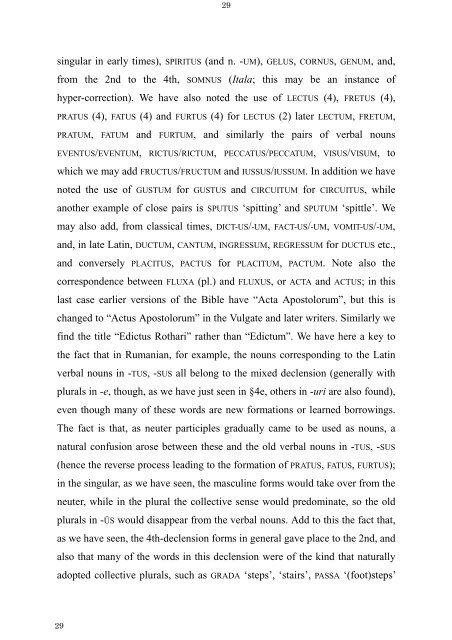The Latin Neuter Plurals in Romance - Page ON
The Latin Neuter Plurals in Romance - Page ON
The Latin Neuter Plurals in Romance - Page ON
You also want an ePaper? Increase the reach of your titles
YUMPU automatically turns print PDFs into web optimized ePapers that Google loves.
29<br />
29<br />
s<strong>in</strong>gular <strong>in</strong> early times), SPIRITUS (and n. -UM), GELUS, CORNUS, GENUM, and,<br />
from the 2nd to the 4th, SOMNUS (Itala; this may be an <strong>in</strong>stance of<br />
hyper-correction). We have also noted the use of LECTUS (4), FRETUS (4),<br />
PRATUS (4), FATUS (4) and FURTUS (4) for LECTUS (2) later LECTUM, FRETUM,<br />
PRATUM, FATUM and FURTUM, and similarly the pairs of verbal nouns<br />
EVENTUS/EVENTUM, RICTUS/RICTUM, PECCATUS/PECCATUM, VISUS/VISUM, to<br />
which we may add FRUCTUS/FRUCTUM and IUSSUS/IUSSUM. In addition we have<br />
noted the use of GUSTUM for GUSTUS and CIRCUITUM for CIRCUITUS, while<br />
another example of close pairs is SPUTUS ‘spitt<strong>in</strong>g’ and SPUTUM ‘spittle’. We<br />
may also add, from classical times, DICT-US/-UM, FACT-US/-UM, VOMIT-US/-UM,<br />
and, <strong>in</strong> late <strong>Lat<strong>in</strong></strong>, DUCTUM, CANTUM, INGRESSUM, REGRESSUM for DUCTUS etc.,<br />
and conversely PLACITUS, PACTUS for PLACITUM, PACTUM. Note also the<br />
correspondence between FLUXA (pl.) and FLUXUS, or ACTA and ACTUS; <strong>in</strong> this<br />
last case earlier versions of the Bible have “Acta Apostolorum”, but this is<br />
changed to “Actus Apostolorum” <strong>in</strong> the Vulgate and later writers. Similarly we<br />
f<strong>in</strong>d the title “Edictus Rothari” rather than “Edictum”. We have here a key to<br />
the fact that <strong>in</strong> Rumanian, for example, the nouns correspond<strong>in</strong>g to the <strong>Lat<strong>in</strong></strong><br />
verbal nouns <strong>in</strong> -TUS, -SUS all belong to the mixed declension (generally with<br />
plurals <strong>in</strong> -e, though, as we have just seen <strong>in</strong> §4e, others <strong>in</strong> -uri are also found),<br />
even though many of these words are new formations or learned borrow<strong>in</strong>gs.<br />
<strong>The</strong> fact is that, as neuter participles gradually came to be used as nouns, a<br />
natural confusion arose between these and the old verbal nouns <strong>in</strong> -TUS, -SUS<br />
(hence the reverse process lead<strong>in</strong>g to the formation of PRATUS, FATUS, FURTUS);<br />
<strong>in</strong> the s<strong>in</strong>gular, as we have seen, the mascul<strong>in</strong>e forms would take over from the<br />
neuter, while <strong>in</strong> the plural the collective sense would predom<strong>in</strong>ate, so the old<br />
plurals <strong>in</strong> -ŪS would disappear from the verbal nouns. Add to this the fact that,<br />
as we have seen, the 4th-declension forms <strong>in</strong> general gave place to the 2nd, and<br />
also that many of the words <strong>in</strong> this declension were of the k<strong>in</strong>d that naturally<br />
adopted collective plurals, such as GRADA ‘steps’, ‘stairs’, PASSA ‘(foot)steps’









